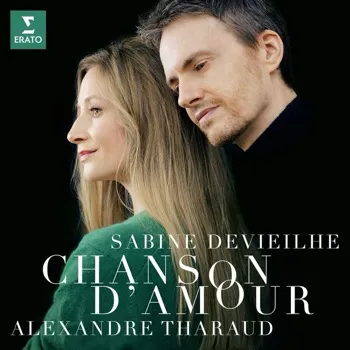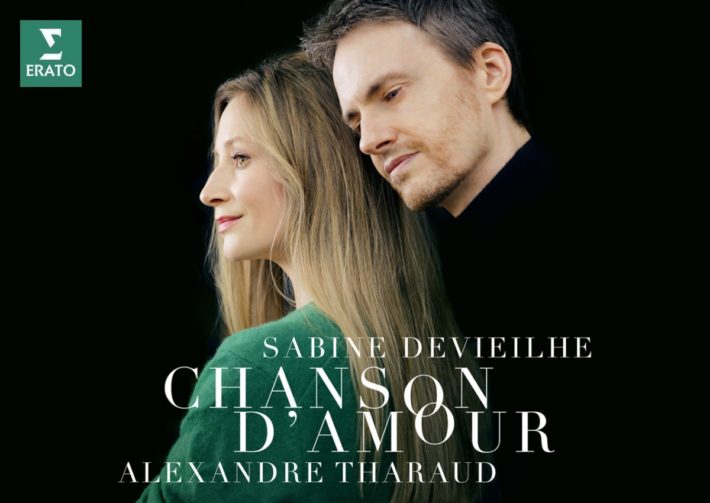Sabine Devieilhe and Alexandre Tharaud have paired previously on tracks of the soprano’s 2017 “Mirages”; their new release, “Chanson d’amour”, is an extended collaboration. Featuring prominent French composers, the works show a metamorphosis between late Romanticism and Impressionism. While many of the songs are fleeting vignettes, each ties into the album’s title, telling its own love story.

The album opens with two Fauré songs; “Au bord de l’eau” (track 2) expresses the joy of togetherness. This theme takes its musical form in an ongoing dovetailing of the melodies. The soprano and pianist heighten the unity with phrases that seem to reach out to each other in a longing call-and-response. Rich and refreshing tonalities are a centerfold here as well, and the duo let us experience them through sensitive color changes.
Next we have 3 songs by Poulenc. “Voyage à Paris” (track 3) departs from the theme of human love, expressing a different sort of adoration: the excitement of coming to Paris. A whimsical emotional palette drives this work from pensive to joyful to even decadent. Devieilhe portrays this masterfully in the vivid changes in tone and timbre while Tharaud transforms the omnipresent waltz into different characters.
“C” (track 4) explores a darker side of love through the poetry of Surrealist Louis Aragorn. The interpretation poses a challenge, given the rather esoteric visions described. The duo is nonetheless able to present a sophisticated understanding of the language. Devieilhe’s opening takes up the reins from Tharaud’s contemplative opening. Holding back on the vibrato in the beginning, she shares a melancholic yet inviting introduction. As the story unfolds, her voice transforms into an even more expressive vehicle, describing both the beautiful and troubling things the narrator sees. Tharauad’s addition of rich sonorities helps convey the musical parallel of light versus dark.
“Fêtes Galantes (track 5)”, the polar opposite of “C”, depicts a lively street filled with bustling people; the performance is likewise fun and exciting. However, it keeps from sounding too frenetic, thanks to a balance between voice and piano. Tharaud’s accompaniment is brisk, yet appropriately measured, allowing the singer to fill her lines with ebullience (not to mention stellar diction). There is also a nice surprise in the latter half (0’32”-0’40”), where she even personifies the different people scurrying along.
From the selection of songs by Ravel, the 5 “Mélodies populaires grecques” are a highlight. These songs emerged from a collaboration between the composer and Michel-Dimitri Calvocoressi, a French-Greek music critic. The two shared an interest in folk music cultivated by Les Apaches – the Parisian music and literary group founded in 1903 – that instilled in them a curiosity in art forms from around the world. Marrying a folk style (the melodies originate from the Northern Aegean island of Chios) with Ravel’s innovative harmonies, these works are intriguing.
“La-bas, vers l’eglise (track 7)” is one of the finest tracks. Despite the largely accompanimental piano textures, Tharaud brings the slightest nuances to light with a scintillating tone. The introduction is neither adorned nor lengthy, but it is the clarity and sheer simplicity that makes it arresting. As the song progresses, we hear the warm middle registers emerge, casting a different light upon Devieihe’s singing, which is just as pristine.
The album features quite a few selections from Debussy, but the “Ariettes oubliees” (tracks 22-27) are by far the best. Though this set predates some of his larger works such as the “Prelude de l’après-midi d’une faune” or the two books of Preludes, there is an evident stylistic thread that connects these works. Both singer and pianist have their moments to shine here, yet also have the fine collaboration we heard on earlier tracks. I especially enjoyed “C’est l’extase” (track 22) – the interpretation takes us back to the theme of unity in love and transports us into a world of languor and imagination.
Recorded at the Siemensvilla in Berlin, the sound engineering brings out both the brightness and subtleties of both performers. At times, however, the voice seems to be favored where a more equal balance might do the fine performances even more justice. This aside, this album is an enjoyable effort from Devieilhe and Tharaud.
“Chanson d’Amour” – Songs and melodies by Debussy, Ravel, Faure and Poulenc
Sabine Devieilhe – Soprano
Alexandre Tharaud – Piano
Warner Classics / Erato, CD 9029522427




















